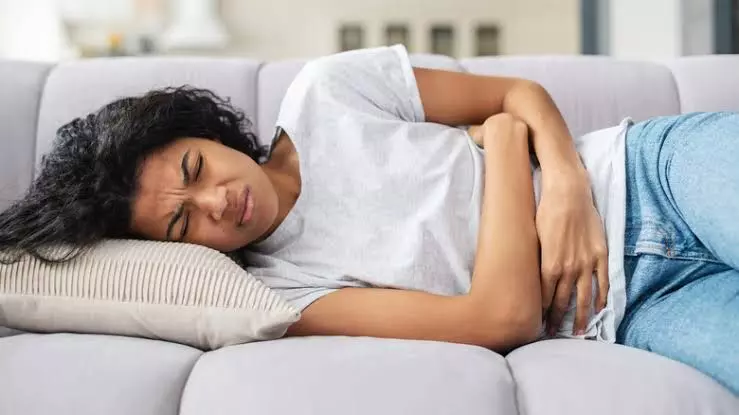Know about Endometriosis: 10% Indian girls, women endure chronic pain, lifelong sickness
Hormonal changes in the body during the menstrual cycle cause the cells in the endometrial-like tissue to grow
By Sulogna Mehta
Hyderabad: Though March is called the Endometriosis Awareness Month, knowledge and understanding about the disease is considerably low globally as well as in India. Endometriosis is a painful gynaecological condition affecting around 10 per cent of girls and women between the reproductive ages of 15 and 49 years.
Women living with the chronic condition of endometriosis suffer from a diverse and complex range of symptoms such as life-impacting pain during periods, sexual intercourse, bowel movements and/or urination, chronic pelvic pain, abdominal bloating, nausea, fatigue and sometimes infertility apart from psychological symptoms like depression and anxiety.
How does endometriosis occur?
Hormonal changes in the body during the menstrual cycle cause the cells in the endometrial-like tissue to grow, and then break down and bleed into places where it cannot escape. While menstrual blood leaves the body during menstruation, this blood remains inside, leading to inflammation and the formation of scar tissue. This scar tissue can form adhesions that can cause severe pelvic pain.
Given the chronic nature of endometriosis and its potential impact on all aspects of women’s lives, the condition needs policy inquiry and further research, which is inadequate in India.
Indian women and living with endometriosis, a study
Recently, the George Institute of Global Health, India, conducted a qualitative study to explore women’s experiences of endometriosis and its impact on them as well as on their partners’ lives. The lead researcher of the study is Dr Preety Rajbangshi, a senior research fellow, leading India’s global health programme at the George Institute.
The research study was undertaken in the states of Delhi and Assam among women above the age of 18 years who were laparoscopically diagnosed with endometriosis. The participants of the study included both women and their partners.
Both married and unmarried women were recruited for the study from a private tertiary care hospital and two private clinics. A total of 21 women participants and 10 male partners were interviewed. The data was collected between November 2021 and mid-2022 using a semi-structured interview guide and analysed thematically thereafter.
Impact on women
The findings suggested a sobering impact of endometriosis on both women and their male partners and the challenges they faced in leading normal lives. Though both women and their partners were impacted in different psychological, physical and financial ways, the impact on the women was significantly higher than that of men.
Diagnostic delay: Diagnostic delay and uncertainty of treatment compelled patients to run between multiple health providers ranging from general practitioners, gynaecologists, alternative medicine including homoeopathy, ayurveda, traditional healers etc, to unqualified practitioners in seek of cure, predominantly for period pain and infertility. This delay was found to be due to a lack of knowledge about the condition and the normalisation of period pain by society.
Educational aspirations: Women suffering from endometriosis reported difficulty in focusing on education and missed classes in school and college during menstruation.
Work-life: Endometriosis severely impacted working women with some reporting quitting their jobs, taking numerous sick leaves, declining job offers, not being considered for promotion at work, and disappointment at being unable to pursue their dreams and meeting their career goals due to working conditions and non-accommodating employers.
Some women had chosen part-time jobs, small businesses or freelance to cope with the condition. Homemakers also reported difficulties in doing their household chores, particularly by women living with in-laws.
Social life and stigma: All women reported reduced participation in social activities with a strong feeling of lack of control, powerlessness and fear of experiencing symptoms in public. Some infertile women reported being ostracised and criticised by people in familial, social, and work circles more than women with children.
Psychological impact on women, their partners
Women felt helpless, anxious, depressed, frustrated, uncertain and be dependent to lead a normal life. Some even had suicidal thoughts and blamed their poor health choices and delayed pregnancy for their condition.
Psychological distress was also caused due to living with uncertainty, apprehension to make plans due to the fear of recurrence and worsening of symptoms and the inability to give birth.
Most men reported feeling helpless for being unable to relieve their partners’ symptoms. All women reported uncertainty about the future and planning for a family. Uncertainty was relatively higher among women who had undergone numerous diagnostics, hormonal treatments and surgery for infertility.
Intimate partner relationships: Most women reported that their partners are supportive and understanding despite the lack of sexual intimacy. Due to the pain experienced by the women during intercourse, their partners reported that endometriosis has affected their sex life but not their relationship.
A few men reported an additional role as a caretaker. They described that they accompanied their partner for consultations and surgery and had provided post-surgery care. A few also reported managing home including cooking and looking after their children and parents.
Financial impact
Both women and men reported incurring out-of-pocket expenditures for treatment including surgery, using household income or savings, selling assets or taking credits or loans. Concurrently, men reported significant financial distress due to their partners’ treatment. The financial burden was higher for men whose partners were undergoing fertility treatment.
Inclusion of relief from endometriosis in health plans
The findings highlight the need to improve early diagnosis and treatment of endometriosis to reduce its impact on women and their partners’ lives. Awareness building among adolescent girls, women and the community for early diagnosis and treatment is a must.
In the Indian context, more research is needed to explore the social significance of endometriosis as a chronic condition. Development of national guidelines for early diagnosis of endometriosis and its inclusion in the Reproductive, Maternal, Newborn, Child and Adolescent Health Programme under the National Health Mission (NHM) is required. There is also a need to include it under the centrally-sponsored health insurance scheme of Pradhan Mantri Jan Arogya Yojana (PMJAY).